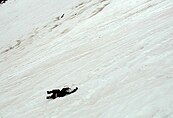The self-arrest is a climbing technique mostly used in mountaineering and alpine climbing where a climber who has fallen and is sliding uncontrollably down a snow or ice-covered slope 'arrests' their fall by themselves by using their ice axe and their crampons.[1]
There are many ways to self-arrest depending on the climber's body position while falling (e.g. falling head-first and/or falling on their back etc.,) but they mostly involve the climber quickly digging the pick of their ice axe into the slope (with the adze of the axe at their shoulder and the axe held at either end diagonally across their body), rolling over onto their stomach so that they can use their full body weight to push down harder on the pick, and simultaneously digging the front-points of their crampons into the slope.[2][3]
Practicing the 'self-arrest' is a core skill set for mountaineers in snow and ice-covered terrain. On steeper ground such as in couloirs (particularly ice-covered), and on glaciers where a rope team member falling into a crevasse is about to drag the other members into the crevasse with them, it is critical that the climber(s) can execute the 'self-arrest' quickly and decisively—ideally performed as an instinctive and instantaneous movement without having to think about how to do it—before speed builds up with more serious consequences.[2][3]
See also
editReferences
edit- ^ McEwan, George (5 March 2015). "Essential Winter Ice Axe Self Arrest". UKClimbing. Retrieved 13 July 2024.
- ^ a b Thomas, Mike; Chelton, Neil (2020). "Chapter: Glacier Travel – Moving on Snow". Glacier Travel and Crevasse Rescue: The Climber's Guide to Accessing Alpine Terrain. ISBN 9798641119205. Retrieved 10 July 2024.
- ^ a b Bloemsma, Katrina (2024). "How to Use an Ice Axe for Mountaineering". REI. Retrieved 9 July 2024.
Further reading
edit- Thomas, Mike; Chelton, Neil (2020). Glacier Travel and Crevasse Rescue. VDiff Climbing. ISBN 979-8641119205.
- The Mountaineers (2018). Mountaineering: The Freedom of the Hills (9th ed.). Quiller Publishing. ISBN 978-1846892622.
- Zawaski, Mike (2013). Snow Travel: Climbing, Hiking, and Crossing Over Snow. The Mountaineers. ISBN 978-1594857201.

